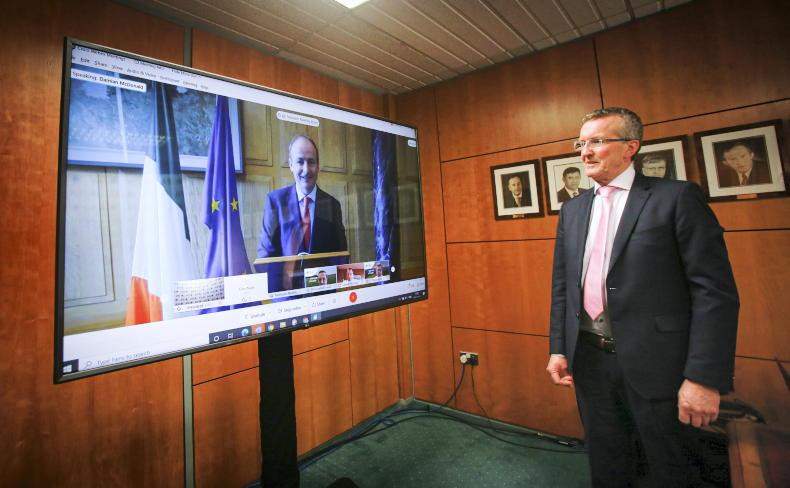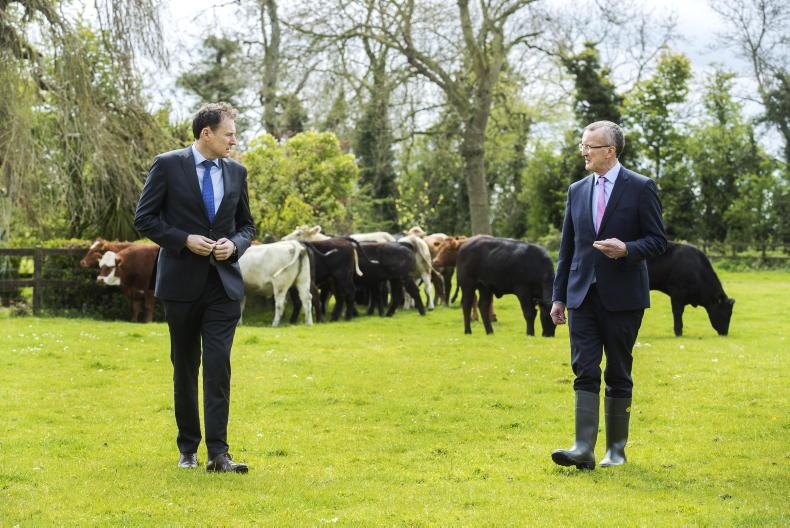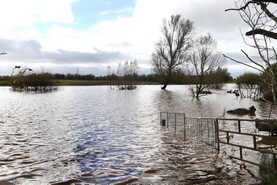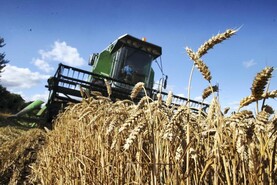As CAP negotiations go down to the wire this week, seldom have we been so sure of the outcome. This will be one of the most destructive CAP reforms for Irish agriculture we have ever seen. Much has been made of the pressure on Minister for Agriculture Charlie McConalogue as he heads to Brussels this week but the reality is that the die has already been cast.
Whatever last-minute tweaks are secured in the coming days, the outcome of this CAP reform will be to severely undermine the economic viability of our suckler, beef, tillage and sheep sectors – while at the same time, it will not fully recognise the environmental dividend being delivered by those on marginal land.
This outcome stems from the fact that rather than being forced to introduce new funding mechanisms to support more environmental demands, EU politicians and policymakers were allowed to raid direct income supports to fund eco-schemes.
Allowing this policy objective – which has been evident since the EU Farm to Fork strategy was launched last May – take root is going to see in the region of €300m per annum diverted away from directly supporting incomes on Irish farms.
Muted political response
Despite the scale of the impact on farmers and rural economies, the political response from Ireland over the past year has been at best muted. The challenges of dealing with the fallout of a pandemic gives some cover, but there is no doubt that the outcome of this CAP reflects the lack of proper political representation at EU level last summer when the direction of travel was being set. It was clear at an early stage in this week’s crunch talks that Ireland was politically isolated on a number of the key issues and lacked influence around the negotiating table.
Farmers are now seeing the full implications of prolonged negotiations last year around the formation of a coalition Government, followed by a merry-go-round of agricultural ministers. We should not overlook the fact that at a series of key meetings of EU agriculture ministers last year, led by Germany, Irish farmers were represented by three different agriculture ministers – and at one crunch meeting last summer had no political representation given the ministerial position was vacant.
Meanwhile, given the extent to which this CAP reform will fail farmers, a review of the negotiating strategy adopted by farm organisations is in order. While an exceptionally weak European commissioner for agriculture in Janusz Wojciechowski has no doubt contributed to the disastrous outcome, it is too easy to simply lay blame at the doorstep of others.
Seldom has there been a Government where the commitment to agriculture and rural Ireland has been more in question
Historically, any proposal from the EU that would have mounted such a direct attack on farm incomes would have brought large numbers of farmers on to the streets of Dublin – the focus being to put the issue centre stage within the Government and for a clear political message to be sent to Brussels.
At the core of this message should have been a farmer-led policy position – one that clearly outlined the economic impact on farm incomes and rural Ireland and presented a coherent policy argument for increased environmental ambition to be met with increased supports – either through CAP or Just Transition funding. Last summer, when the EU was allocating the €17.5bn Just Transition fund to aid in the green transition, Ireland and Irish farmers were forgotten, securing just 0.4% of the fund at €77m – only Malta and Luxembourg received a lower share.

An Taoiseach Micheál Martin addressing the 66th IFA AGM and its president Tim Cullinan.
Again, COVID-19 provides some cover for the lack of boots on the street, but this should have refocused attention on the need to adopt farmer-led policy that was informed with the facts, robust, credible and would influence the direction of travel from an early stage.
Did adopting a policy of upwards only convergence until weeks before the final negotiations deliver this? Ultimately, farmers will decide.
If the impact of this flawed CAP reform is to be minimised, all parties need to learn lessons. Seldom has there been a Government where the commitment to agriculture and rural Ireland has been more in question. If this is to change, Government must now take a flawed CAP from the EU and use all the flexibilities within it to make sure it fits Irish farming – in terms of budget and scheme design. As Amy Forde reports on pages 20-21, the direction of travel at present is more costs and increased compliance at farm level.
Environmental package
The IFA is right to turn the focus on to Government both in relation to co-financing and its commitment to a €1.5bn environmental package. If the suckler, tillage and sheep sectors are to have a viable future, it is critical that the level of support within Pillar 2 is maximised and that these funds are front-loaded at the low-income sectors.
There is discontent within the IFA around coupling – the current position to disregard the option to couple payments within Pillar 1 will only be credible if support is secured and ring-fenced within Pillar 2 for a €30 per ewe and €300 per cow payment.
If this is to be delivered, farmer organisations will need to move beyond reactionary lobbying. They must now position themselves centre stage in the creation of the national strategic plan and in the design and implementation of schemes. Sitting on the sidelines waiting to react to the decisions of politicians and civil servants may provide a safe haven but is not in the best interests of farmers.
As CAP negotiations go down to the wire this week, seldom have we been so sure of the outcome. This will be one of the most destructive CAP reforms for Irish agriculture we have ever seen. Much has been made of the pressure on Minister for Agriculture Charlie McConalogue as he heads to Brussels this week but the reality is that the die has already been cast.
Whatever last-minute tweaks are secured in the coming days, the outcome of this CAP reform will be to severely undermine the economic viability of our suckler, beef, tillage and sheep sectors – while at the same time, it will not fully recognise the environmental dividend being delivered by those on marginal land.
This outcome stems from the fact that rather than being forced to introduce new funding mechanisms to support more environmental demands, EU politicians and policymakers were allowed to raid direct income supports to fund eco-schemes.
Allowing this policy objective – which has been evident since the EU Farm to Fork strategy was launched last May – take root is going to see in the region of €300m per annum diverted away from directly supporting incomes on Irish farms.
Muted political response
Despite the scale of the impact on farmers and rural economies, the political response from Ireland over the past year has been at best muted. The challenges of dealing with the fallout of a pandemic gives some cover, but there is no doubt that the outcome of this CAP reflects the lack of proper political representation at EU level last summer when the direction of travel was being set. It was clear at an early stage in this week’s crunch talks that Ireland was politically isolated on a number of the key issues and lacked influence around the negotiating table.
Farmers are now seeing the full implications of prolonged negotiations last year around the formation of a coalition Government, followed by a merry-go-round of agricultural ministers. We should not overlook the fact that at a series of key meetings of EU agriculture ministers last year, led by Germany, Irish farmers were represented by three different agriculture ministers – and at one crunch meeting last summer had no political representation given the ministerial position was vacant.
Meanwhile, given the extent to which this CAP reform will fail farmers, a review of the negotiating strategy adopted by farm organisations is in order. While an exceptionally weak European commissioner for agriculture in Janusz Wojciechowski has no doubt contributed to the disastrous outcome, it is too easy to simply lay blame at the doorstep of others.
Seldom has there been a Government where the commitment to agriculture and rural Ireland has been more in question
Historically, any proposal from the EU that would have mounted such a direct attack on farm incomes would have brought large numbers of farmers on to the streets of Dublin – the focus being to put the issue centre stage within the Government and for a clear political message to be sent to Brussels.
At the core of this message should have been a farmer-led policy position – one that clearly outlined the economic impact on farm incomes and rural Ireland and presented a coherent policy argument for increased environmental ambition to be met with increased supports – either through CAP or Just Transition funding. Last summer, when the EU was allocating the €17.5bn Just Transition fund to aid in the green transition, Ireland and Irish farmers were forgotten, securing just 0.4% of the fund at €77m – only Malta and Luxembourg received a lower share.

An Taoiseach Micheál Martin addressing the 66th IFA AGM and its president Tim Cullinan.
Again, COVID-19 provides some cover for the lack of boots on the street, but this should have refocused attention on the need to adopt farmer-led policy that was informed with the facts, robust, credible and would influence the direction of travel from an early stage.
Did adopting a policy of upwards only convergence until weeks before the final negotiations deliver this? Ultimately, farmers will decide.
If the impact of this flawed CAP reform is to be minimised, all parties need to learn lessons. Seldom has there been a Government where the commitment to agriculture and rural Ireland has been more in question. If this is to change, Government must now take a flawed CAP from the EU and use all the flexibilities within it to make sure it fits Irish farming – in terms of budget and scheme design. As Amy Forde reports on pages 20-21, the direction of travel at present is more costs and increased compliance at farm level.
Environmental package
The IFA is right to turn the focus on to Government both in relation to co-financing and its commitment to a €1.5bn environmental package. If the suckler, tillage and sheep sectors are to have a viable future, it is critical that the level of support within Pillar 2 is maximised and that these funds are front-loaded at the low-income sectors.
There is discontent within the IFA around coupling – the current position to disregard the option to couple payments within Pillar 1 will only be credible if support is secured and ring-fenced within Pillar 2 for a €30 per ewe and €300 per cow payment.
If this is to be delivered, farmer organisations will need to move beyond reactionary lobbying. They must now position themselves centre stage in the creation of the national strategic plan and in the design and implementation of schemes. Sitting on the sidelines waiting to react to the decisions of politicians and civil servants may provide a safe haven but is not in the best interests of farmers.







 This is a subscriber-only article
This is a subscriber-only article










SHARING OPTIONS: